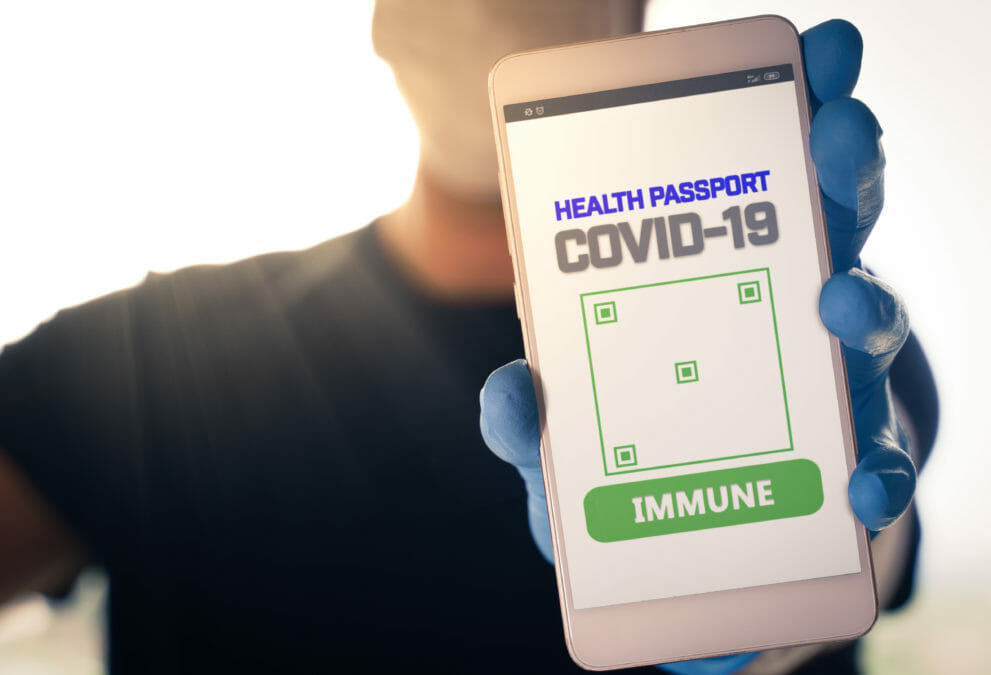Covid-19 immunity passports have been touted as a possible way to suppress the future impact and spread of the virus.
In theory, immunity passports could help take the strain off increasingly stretched healthcare systems and help reinvigorate shrinking economies.
However, as the UK’s effort to implement its track and trace programme proved, there is a real fear that technologically enabled responses to Covid-19 could impact data privacy.
Despite this, according to TrueProfile.io, the provider of primary source verification (PSV) services, blockchain offers some hope for alleviating these privacy fears, setting the stage for the technology to finally break through into the mainstream.
Immunity passports
Immunity passports aim to link an individual’s identity with their Covid-19 test status, opening up a way out of lockdown restrictions for those that are proven to be immune to the disease.
This means that any immunity passport would rely on antibody tests — which are intended to show whether someone has recovered from the infection — to then provide certification that a person is immune and cannot catch the virus again.
Covid-19 and digitalisation: 4 areas of tech set to boom post-pandemic
Sensitive information
Covid-related immunity passports are likely to contain sensitive and personal health data.
This has implications for data privacy, with many concerned about how the data will be stored and who will have access to the data.
This is where blockchain — the decentralising technology typically associated with Bitcoin and cryptocurrencies — can be used to ensure data governance and that user privacy will not be compromised.
René Seifert, co-head at TrueProfile.io, explained: “A blockchain-enabled digital immunity passport could be viable if end-users provide proof of ID before testing and a permanent ‘digital fingerprint’ of the certificate is placed on the blockchain, which is used by a verifier, such as an employer, to check authenticity.
“Crucially, as test results are stored as a ‘fingerprint’, this offers a form of encryption and makes sure that the digital certificate provided to the end-user is secure and tamper-proof by design, which means it is unalterably linked to their identity. For those more concerned about the data security, as each ‘fingerprint’ is individual and does not reveal any information about whom the document belongs to, it also safeguards the information it contains.”
He continued: “The fundamental assumption in blockchain is that a centralised data monitoring or validation is not required among a network of distributed databases, because some pre-agreement about data validation has been conducted. This makes it ideal for the immunity passport use-case, as no central party has control over its content, giving the end-user complete control of how their health data is being used.
“Utilising this technology could also alleviate concerns over a wider surveillance infrastructure (including a contact tracing app) that will collect data beyond the purposes of determining people who are potentially immune to COVID-19.
“Ultimately, implementing this technology into such an important and urgent issue would likely bring it into the mainstream consciousness and out of the shadow of Bitcoin and the world of cryptocurrency.”
The practical application of blockchain in procurement
Work with caution
Despite the privacy guarantees that a blockchain-enabled immunity passport can afford, Seifert also believes that a strong dose of caution needs to be kept in mind before developers get ahead of themselves.
The World Health Organisation (WHO) has consistently warned about a lack of scientific evidence for Covid-19 immunity, saying those who wrongly believe themselves to be immune could get reinfected or transmit the disease further. For Seifert, this has the potential to derail the concept of digital immunity passports entirely.
Indeed, yesterday it was announced that Covid-19 immunity could be lost within months after contracting the virus. This would render immunity passports, regarding the current pandemic, obsolete and potentially dangerous. But, this latest healthcare warning has not been confirmed.
Follow the science
“At present, the biggest barrier to immunity passports is the testing itself. First, immunity tests need to possess higher levels of sensitivity and specificity, which are essential measures to express the rate of false negatives and false positives of a result,” continued Seifert.
“More worryingly, due to the novelty of the disease, scientists don’t have enough data on the body’s immune responses. This means that we simply don’t know how long someone remains immune to Covid-19 — or even if they can become immune at all in the case of asymptomatic patients.
“As such, a more sensible line of action would be to follow the science. For a blockchain-enabled immunity passport to truly work effectively and be taken seriously, it is crucial that Covid-19 tests not only have high levels of sensitivity and specificity, but any antibody test is proven to show that end-users cannot get infected again. However, this should not mean that governments and healthcare bodies abandon the development of blockchain-enabled immunity passports altogether, as the time may come when this sort of technology could be highly effective and help keep citizen health data secure and decentralised,” he added.







